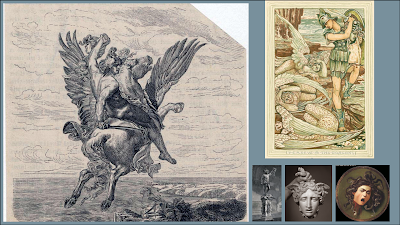How I Learned to Stop Worrying and Just Love the Epic!
On Loving the Greek Epic Form
 |
| Odysseus slays the suitors (while Penelope and Telemachus Look On) |
I have a penchant for Greek epic. It's the absolute in the epic I adore. The epic form does seem outdated. But it lives on in presidential speeches and high arching ontologies. Odysseus is an epic wanderer. He's clever. He's stubborn. And he risks the lives of others for his own gain. That's who he is. I think they call it an archetype. Odysseus the man of many wiles. They don't call him that for nothing. I don't like the epic for all those reasons, though: I like the epic form simply because I like to think of the stories of Homer and so forth as unmoored from traditional metaphysics.
Living Life Like I Am a Character in a Novel
I live more like a novel. Or at least when I read novels, especially contemporary novels, that is the vibe I feel. Maybe I should say I want to live my life novelistically rather than epically. Or maybe I should say to live one's life like an epic is foreclosed to us. To think of the world metaphysically has never been all that simple, or might I say, successful. We see in the novel something akin to what it means to live day to day in our modern life. We see in the epic something "satisfactory" to quote the Wise Men in T.S. Elliot's poem about the former dispensation of gods forgotten.
A New Dispensation: God is Dead
I would say the new dispensation is the forgetting of God. Of absolutes. God is still around. We just forget to not believe in him so he sticks around, lingers, like a photograph of a former boyfriend you keep for memory's sake.
I am not saying this mantra "God is dead," in a purely Nietzchean sense, but maybe more like God has been dead (no one killed him), and we like to keep his poster still tacked to the wall.
I'm The Type of Guy Who Likes to Wander 'Round
Which is why the wanderer is an apt modern trope. For Odysseus, it is a mark of human fragility and the inevitable consequence of a man who forsakes God. For the modern wanderer, it is not so much the case we wander because of something the Greeks called excessive pride (hubris). Still, instead, it is a search for different authority unrelated to a top/down structure of power. To wander is more like to stumble about looking for what authorizes existence.
We wander because to stay still is too Medieval.
We keep it going. Kierkegaard's category of immediacy, it turns out, is not a definition of despair but rather an accurate depiction of humanity. If the immediate man is the despairing man, then I would have to claim that all men are despairing.
Growing Up and What That Means for Me
What happens to philosophy when it grows up? Does it become a wanderer sans the narrative script of Greek verse?
I only say all this to mask a more autobiographical story.
I've been in flux. I am in between apartments. Moving from one place to another always unsettles me.
Or maybe it's the tracts passed out in the subway stations announcing the end of the world on May 21, 2011.
And, Finally a Dedication to Walker Percy and György Lukács
I dedicate my homelessness to Walker Percy and György Lukács. No, don't worry, I am not writing a doctoral dissertation on those two guys. It would be fun. I am lucky if I can land a teaching gig this summer. Pay my rent. Eat hot dogs on Coney Island and manage to subsist on anything that can be stir-fried in a wok.
Peace out.
 I am an educator and a writer. I was born in Louisiana and I now live in the Big Apple. My heart beats to the rhythm of "Ain't No Place to Pee on Mardi Gras Day". My style is of the hot sauce variety. I love philosophy sprinkles and a hot cup of café au lait.
I am an educator and a writer. I was born in Louisiana and I now live in the Big Apple. My heart beats to the rhythm of "Ain't No Place to Pee on Mardi Gras Day". My style is of the hot sauce variety. I love philosophy sprinkles and a hot cup of café au lait.


 I am an educator and a writer. I was born in Louisiana and I now live in the Big Apple. My heart beats to the rhythm of "Ain't No Place to Pee on Mardi Gras Day". My style is of the hot sauce variety. I love philosophy sprinkles and a hot cup of café au lait.
I am an educator and a writer. I was born in Louisiana and I now live in the Big Apple. My heart beats to the rhythm of "Ain't No Place to Pee on Mardi Gras Day". My style is of the hot sauce variety. I love philosophy sprinkles and a hot cup of café au lait.

 I am an educator and a writer. I was born in Louisiana and I now live in the Big Apple. My heart beats to the rhythm of "Ain't No Place to Pee on Mardi Gras Day". My style is of the hot sauce variety. I love philosophy sprinkles and a hot cup of café au lait.
I am an educator and a writer. I was born in Louisiana and I now live in the Big Apple. My heart beats to the rhythm of "Ain't No Place to Pee on Mardi Gras Day". My style is of the hot sauce variety. I love philosophy sprinkles and a hot cup of café au lait.